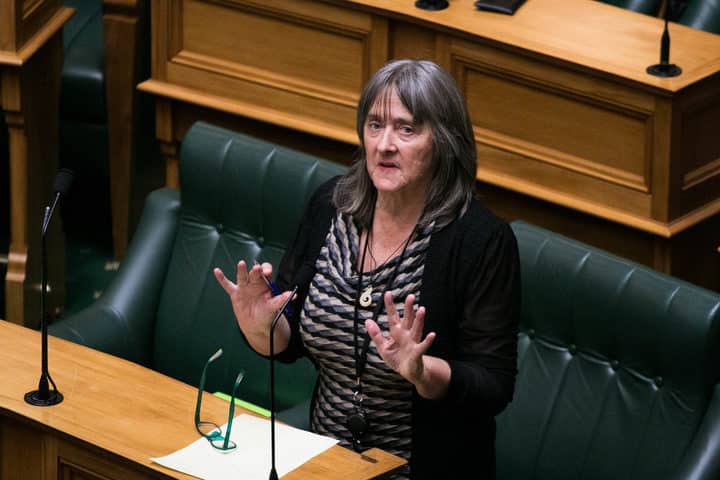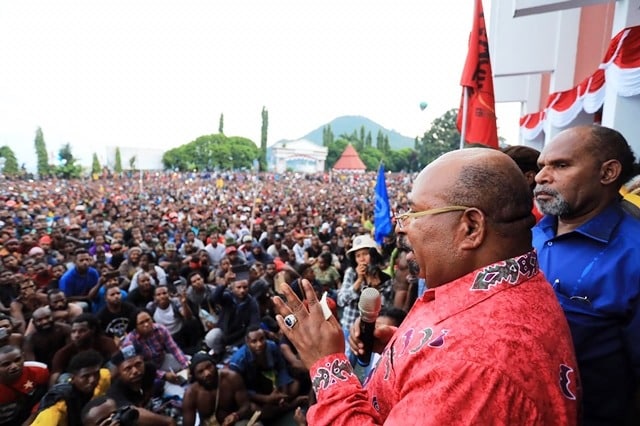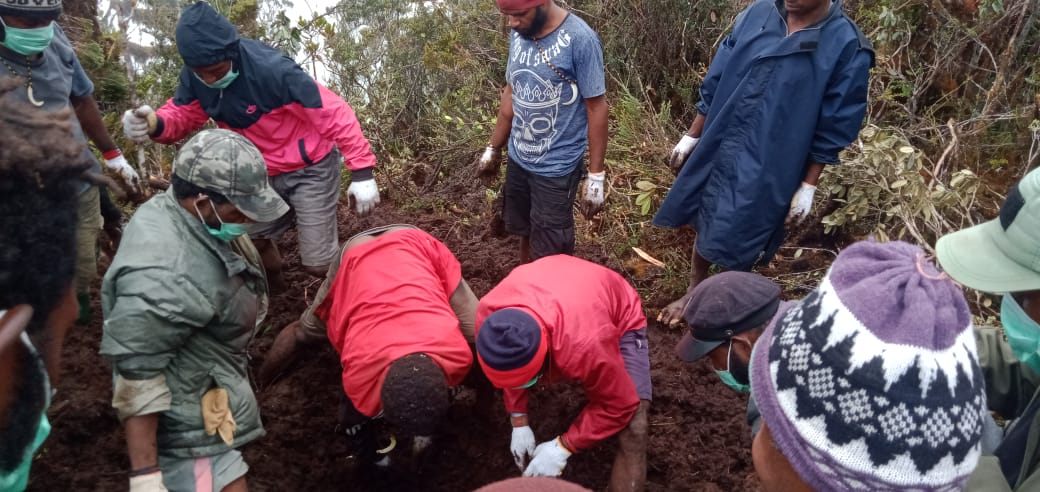
By Dr Jim Elmslie
Honiara, Jubi – When considering the West Papuan application for MSG membership, Papua New Guinea should look closely at its own national interests.
These national interests are threatened by the explosive demographic changes and economic development currently underway across West Papua, but particularly along the 800 kilometer border with Indonesia.
PNG’s faces the very real risk of large numbers of West Papuan refugees destabilizing the entire western portion of the country, and the inevitable Indonesian military incursions that would follow.
The core of this threat is the fact that West Papua has suffered a demographic catastrophe since the Indonesian military takeover in 1962. Since 1971 the Papuan portion of the population has declined from 96% to less than 50% across the whole country.
In urban areas migrants make up the overwhelming majority, although in most rural areas Melanesians are still the majority. However as the migrant population continues to grow at 10.82%, while the Papuan population grows at only 1.84%, if current policies continue the Papuans will make up less than a third of the population by 2020 and thereafter be a dwindling minority.
Where this is relevant to PNG is that the two population groups: Christian Melanesian Papuans, and Muslim Asian Migrants, are fundamentally very different.
Furthermore research by Indonesian scholar, Cypri Dale, in the Keerom area between Jayapura and the PNG border near Vanimo, shows that the two groups live very different lives.
In this region in 2010, 60% of the population were migrants and 40% Papuans (using the above growth rates for the two groups would put the current population breakdown at 70:30 respectively in 2015). The two groups live in clearly defined areas with migrant regions containing almost all the sealed roads; electricity supply; running water; doctors and health facilities; schools, and government services, with the exception of military posts, most of which were in the Papuan areas. Economic and social development has been effectively ‘captured’ by the migrants.
Furthermore the two groups fear and mistrust each other: the migrants considering the Papuans backward and dangerous, while the Papuans are resentful of the migrants and terrified of the Indonesian military and police, who always side with migrants when conflicts arise.
Worse still, recent anecdotal reports have indicated that the police and soldiers are arming migrants. All this is creating a powder keg environment where even a small conflict can quickly escalate. The Papuans will lose these conflicts and the potential, or perhaps inevitability, of refugees is obvious. As are the consequences for PNG by having large numbers of refugees on its side of the border.
A key driver of this corrosive development is the loss of Papuan traditional land, both from the increasing number of migrant farmers establishing and expanding their operations, and by the establishment of large scale (over 20,000 hectare) oil palm plantations.
Massive oil palm plantations are planned or underway across West Papua, with the biggest single development in the Merauke region (on PNG’s southern border region). The Merauke Integrated Food and Energy Estate will comprise of as much as 5 million hectares, with the first 1.25 million hectares fast tracked two weeks ago by President Jokowi to be completed in three years. The local landowners have not been consulted at all.
One possible action to slow or halt these processes is the recognition of traditional lands rights. Mechanisms already exist on a national scale for these rights to be granted under Indonesian law, as shown by Australian land rights researcher, Clancy O’Donnell.
Specifically these laws are the Indonesian Forestry Law 1999 and the Village Law 2014. These laws would enable traditional land owners to determine how their land is used, thus empowering them to stop the establishment of oil palm plantations. All they need is the provincial legislature in Jayapura to pass enabling legislation for the national laws to be triggered.
Here’s the rub. Many Indonesians, starting with President Jokowi, believe that it is in the national interest of Indonesia to develop these regions with more plantations and more migrants to work on them. They don’t want the process impeded by Papuan land rights, so the enabling laws are not passed.
This illustrates that PNG and Indonesia have fundamentally different national interests over West Papua. For PNG this is crucial: the country has enough grave problems without having its north coastline (Vanimo to Wewak) burdened with large numbers of refugees.
Indonesia is mostly concerned about ensuring the sovereignty of the Papuan provinces and sees this best achieved by marginalizing the Papuans and developing the border – except that this creates the problems outlined above.
In the end this might prove to be a disastrous choice for Indonesia. It may well result in large scale intercommunal violence that damages Indonesia’s international image and actually promotes international support for the West Papuan independence movement.
How can these problems be tackled? One way is by giving the Papuan umbrella group, the United Liberation Movement for West Papua membership in the MSG.
This would put pressure on Indonesia to start dealing fairly with its Melanesian citizens by recognizing their land rights through the implementation of enabling legislation in the provincial assembly, as well as reigning in gross human rights abuses that have reached epidemic proportions in 2015 (largely in response to the ULMWP bid for the MSG).
This need not question Indonesia’s sovereignty over West Papua, but would be an expression of support for West Papuan self-determination, particularly on the ground in villages where most West Papuans live.
If the MSG gives membership to Indonesia this chance will have been lost. Indonesian officials, whatever their race, will be obliged to follow Jakarta’s orders. Even if the representatives are the Governors of the Indonesia’s Melanesian provinces, as has been suggested) their ability to talk openly will be severely curtailed: former Papua Governor, Jap Salossa, is widely believed to have been poisoned in 2005 (a common tactic in West Papua) when he criticized Jakarta, although he was buried without an autopsy; yet another murky death in a land where many thousands have died mysteriously, or simply disappeared.
ULMWP is the only organization that can talk openly about the problems that exist in West Papua. Clearly this organization’s aim is independence for West Papua. This is because it is almost a universal sentiment amongst West Papuans that only through independence will they be able to live in peace and freedom, with their basic land and human rights respected.
They are rapidly gaining support throughout the region and across the world, driven by social media broadcasting gruesome evidence of ongoing gross human rights violations. It is actually in Indonesia’s interests to engage in meaningful dialogue with the West Papuans under the auspices of the MSG, something they would be forced to do if ULMWP was admitted.
The geographic centre of the debate over West Papua would shift from Jakarta to Port Vila, where the MSG is headquartered. This would be a good thing too.
It would force Jakarta to develop a clear policy on West Papua rather than the fractured and contradictory profusion of policies that now exist: even when the President announces policies such as allowing the entry of journalists, or the end of transmigration, he is immediately over ruled by ministers and bureaucrats. When the President himself cannot explain government policy it is clearly in a shambles.
As with all conundrums opportunity lurks: common ground must be sought and creative win-win policies pursed. For PNG that clearly lies with including UMLWP in the MSG as a way of protecting its western regions from refugees fleeing the humanitarian disaster unfolding in West Papua.
For Indonesia it would force the country to come to terms with its Melanesian subjects, not through marginalization, dispossession and annihilation – which will actually increase international support for West Papuan independence while running the very real risks of mass violence and even genocide, but through dialogue and negotiation.
And for the West Papuans themselves, victims as they are of an arbitrary European imposed border, any improvement in their basic rights would be a real gain, although they are unlikely to give up their calls for independence any time soon.
Dr Jim Elmslie is Visiting Scholar at the Centre for Peace and Conflict Studies, University of Sydney. His book, Irian Jaya Under the Gun: Indonesian Economic Development versus West Papuan Nationalism, was published by University of Hawaii Press in 2002.
– See more at: http://www.pngloop.com/2015/06/23/png-ignores-west-papua-peril/#sthash.8CRvgymD.dpuf
















